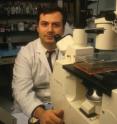Researcher at Childrens Hospital LA discovers way to overcome radiation resistance in leukemia
A team of researchers lead by Fatih M. Uckun, MD, PhD, of The Saban Research Institute of Childrens Hospital Los Angeles has determined that radiation resistance in leukemia can be overcome by selectively attacking a molecular target known as SYK tyrosine kinase. B-lineage acute lymphoblastic leukemia (ALL) is the most common cancer occurring in children and adolescents. Despite having received intensive chemotherapy, some patients have recurring disease, known as relapse. For these individuals, the prospect of long-term survival is poor.
The standard approach to treating relapsed patients has been additional chemotherapy to achieve a second remission followed by very intensive treatment that could include "supralethal" chemotherapy, total-body irradiation (TBI), and hematopoietic stem cell transplantation. However, radiation resistance of leukemia cells hampers the success of these rigorous therapeutic approaches and results in poor survival.
"We knew that we could kill radiation-resistant leukemia cells if we only knew what made them so resistant. So we set out to determine the mechanism," said Dr. Uckun, who is also professor of Research Pediatrics at the Keck School of Medicine at the University of Southern California. "Once we determined the mechanism, the next step was obvious -- to rationally design a drug that would take out that specific target."
Uckun's research team has now provided the first proof-of-principle that radiation resistance of an aggressive leukemia can indeed be overcome using this rationally-designed specific drug directed against the resistance machinery of leukemia cells.
"Radiation therapy was much more effective against leukemia in mice when it was combined with this new drug candidate that we named C-61," said Dr. Uckun.
Source: Children's Hospital Los Angeles
Other sources
- Researcher discovers way to overcome radiation resistance in leukemiafrom PhysorgThu, 30 Sep 2010, 13:49:15 UTC
